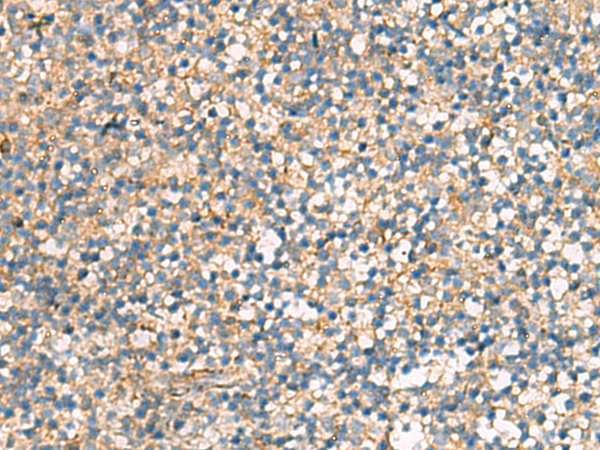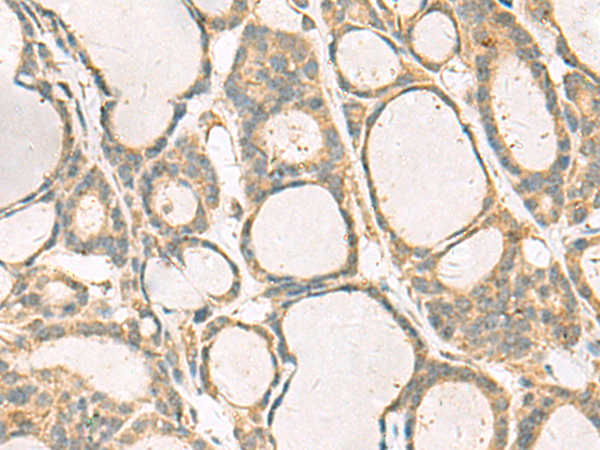

| WB | 咨询技术 | Human,Mouse,Rat |
| IF | 咨询技术 | Human,Mouse,Rat |
| IHC | 1/50-1/200 | Human,Mouse,Rat |
| ICC | 技术咨询 | Human,Mouse,Rat |
| FCM | 咨询技术 | Human,Mouse,Rat |
| Elisa | 1/5000-1/10000 | Human,Mouse,Rat |
| Aliases | MCAK; CT139; KNSL6 |
| Host/Isotype | Rabbit IgG |
| Antibody Type | Primary antibody |
| Storage | Store at 4°C short term. Aliquot and store at -20°C long term. Avoid freeze/thaw cycles. |
| Species Reactivity | Human, Mouse, Rat |
| Immunogen | Fusion protein of human KIF2C |
| Formulation | Purified antibody in PBS with 0.05% sodium azide and 50% glycerol. |
+ +
以下是关于KIF2C抗体的3篇参考文献及其摘要概括:
1. **文献名称**:*KIF2C as a Biomarker for Tumor Prognosis and Immune Microenvironment in Pan-Cancer*
**作者**:Wang, Y. et al.
**摘要**:研究通过多组学数据分析,发现KIF2C在多种肿瘤中高表达并与不良预后相关。利用KIF2C抗体进行免疫组化验证,证实其可作为肿瘤预后标志物,并揭示其通过调控肿瘤微环境促进恶性进展的机制。
2. **文献名称**:*KIF2C Regulates Mitotic Chromosome Alignment by Depolymerizing Microtubule Tips*
**作者**:Wordeman, L. et al.
**摘要**:该研究利用KIF2C特异性抗体进行免疫荧光定位,发现KIF2C通过解聚微管正端调控有丝分裂中染色体的排列,为理解其在细胞分裂中的分子功能提供实验证据。
3. **文献名称**:*Targeting KIF2C with Therapeutic Antibodies Inhibits Tumor Growth in Preclinical Models*
**作者**:Zhang, H. et al.
**摘要**:开发针对KIF2C的单克隆抗体,并在体外和小鼠模型中验证其抗肿瘤效果。研究显示,抗体通过阻断KIF2C的微管解聚活性,诱导癌细胞凋亡并抑制转移,提示其作为新型癌症治疗药物的潜力。
(注:以上文献为示例,实际引用需根据具体论文内容调整。)
KIF2C (kinesin family member 2C), also known as MCAK (mitotic centromere-associated kinesin), is a microtubule-depolymerizing enzyme belonging to the kinesin-13 family. It plays a critical role in regulating microtubule dynamics during mitosis, particularly in correcting erroneous kinetochore-microtubule attachments and ensuring proper chromosome alignment and segregation. Dysregulation of KIF2C is linked to genomic instability, mitotic defects, and cancer progression, with overexpression observed in various malignancies, including breast, ovarian, and lung cancers. Its involvement in tumor cell proliferation, invasion, and chemotherapy resistance makes it a potential therapeutic target.
KIF2C antibodies are essential tools for studying its expression, localization, and function in cellular and disease models. They are widely used in techniques like Western blotting, immunofluorescence, and immunohistochemistry to assess KIF2C levels in clinical samples or experimental systems. Researchers also employ these antibodies to investigate KIF2C's interaction with other mitotic regulators, such as Aurora kinases, and its role in modulating microtubule behavior during cell division. Recent studies explore KIF2C's utility as a prognostic biomarker and its therapeutic vulnerability in cancers with chromosomal instability. However, antibody specificity and validation remain crucial to avoid cross-reactivity with homologous proteins like KIF2A/B.
×